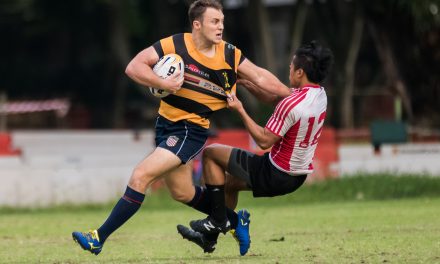As we look forward to another exciting HSBC Rugby Sevens tournament in Singapore, it’s important to focus on the unique aspects of nutrition, hydration and heat management for players.
Playing in conditions of up to 96% humidity and temperatures exceeding 30 degrees Celsius takes its toll on any athlete’s body. Add to this the fast nature of the sevens game, with minimal rest periods and we have a recipe for heat exhaustion. Hydration, proper nutrition and managing a player’s core temperature are the keys to healthy game performance.
Effective hydration and nutrition begins well before game day and should be planned to maximise the condition of the player. In addition, to reduce the impact of heat and humidity, players should be conditioned with prior training sessions under similar climatic situations.
As highlighted by the American College of Sports Medicine (2013), “Athletes especially at risk for developing a heat illness are individuals who are overweight, dehydrated, under-conditioned or very muscular. Those who practice during the hottest times of the day (usually 10 a.m. – 5 p.m.) and who are not acclimated to the environment, have to wear protective equipment (helmet, shoulder pads) or have a history of heat illness are also at elevated risk.”
HYDRATION STRATEGIES:
Prior to Game Day
The number one objective on game day should be to start the day fully hydrated and well nourished. Use the day prior to the match to increase fluid intake and hydrate well. A general rule for males in tropical climates is a minimum of 3 litres of water per day but a better measure may be to simply listen to your body. Urine should be almost clear. If you find it concentrated and dark yellow you need to bring your water intake up.
On the flipside, hyper hydration or drinking too much plain water can be an issue for players. A recent report in the British Journal of Sports Medicine found many athletes are at risk of exercise – associated hyponatremia, which is an electrolyte imbalance caused by flushing the body with too much water. To combat this it is recommended players consume electrolytes, such as PURE Electrolyte Hydration dissolved in water, in the day prior.
The day should also include regular meals with protein, small amounts of fat and a moderate amount of slow digesting carbohydrates, like wholegrain pasta, sweet potato or even oats in the evening.
Game Day Nutrition
An early breakfast focusing on complex carbohydrates and fats will provide stable blood sugars and sustained energy for the morning.
Some great choices may include:
Oats with fruit and boiled eggs
Muesli, fresh fruit and high protein yoghurt
Toast and peanut butter
For some that suffer game day nerves, or if the first game is too early to be able to fully digest a large meal, a liquid meal may be the answer. A smoothie can be easily digested while still packing a nutrition punch. Consider a delicious vanilla smoothie with oats and banana. The addition of banana offers the added bonus of providing a potassium boost, which helps combat cramping as a result of sweat loss.
Ingredients:
.3-cup oats
500 mls milk/almond milk
1 Banana
5 scoops PURE Whey Protein – Vanilla Bean
Blend all together with a small amount of ice until thick and fluffy.
Meals should be consumed at least 2 hours prior to the game however, in the case of a Sevens tournament, often the games are played with little break for the players in between. Therefore, players should focus on energy dense and light food for proper digestion between matches and ensure they keep eating throughout the day to maintain energy levels.
Further liquid alternatives like PURE Endurance Hydration that incorporate a small amount of whey protein, with carbohydrates and electrolytes are ideal between matches.
To maintain energy and hydration, a non-carbonated carbohydrate electrolyte drink like PURE electrolyte hydration should be consumed over the day, in preference to water alone.
Post Tournament
Immediately after the last game, a small meal of carbohydrate and protein should be consumed to begin the recovery process. The best option is a light, easily digestible liquid meal. A recovery drink, such as a protein shake within half an hour after the game will start the process of repairing muscles. Similar to PURE Exercise Recovery Organic Cocoa and Honey, it should contain a small amount of carbohydrate in addition to protein.
To further replenish hydration levels, over a few hours, drink 500ml of water for each ½kg lost.
Within two hours a full meal of protein, vegetable and carbohydrates should be eaten. This may be something as hearty as a Casserole and potatoes or rice to help repair muscles and replenish lost carbohydrate stores.
The final word on post match nutrition
Many rugby players consume alcohol post match and this should be avoided. It impairs recovery and only adds to dehydration. Particularly within the hot and humid climate of Singapore, reducing the body’s core temperature and increasing levels of hydration as quickly as possible should be the focus. In addition, steps should be taken to start replenishing muscle glycogen for proper recovery. All of this, well before the first beer!
#drinkpure #puresportsnutrition
Link: livefitasia
References
ACSM. (2013, January 13). Preparing For and Playing In the Heat [Blog post]. Retrieved from https://www.acsm.org/public-information/articles/2012/01/13/preparing-for-and-playing-in-the-heat
|
Roz Alexander,
Nutritional Consultant,
Simply Active Pte Ltd
|



